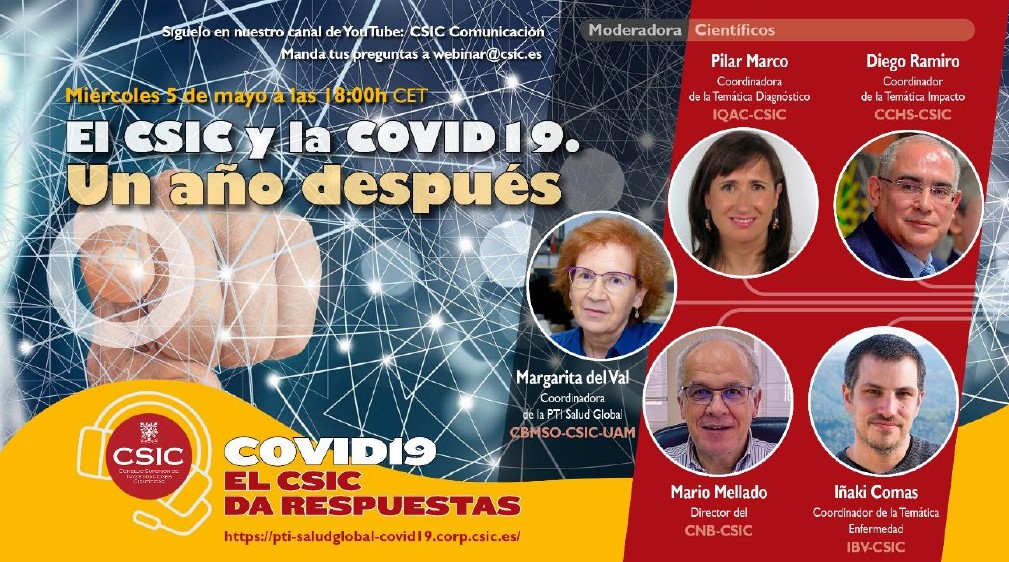
– Margarita del Val, Pilar Marco, Mario Mellado, Diego Ramiro and Iñaki Comas will disseminate, in a webinar through YouTube, the works on the disease, diagnosis and social impact
– The platform investigates the new coronavirus in six areas: prevention, disease, containment and diagnosis, treatment and vaccines, social impact and communication
Five experts from the Higher Council for Scientific Research (CSIC) will explain in a webinar broadcast on YouTube, on Wednesday, May 5 at 6:00 p.m., the results of a year of research at the CSIC on the SARS-CoV-2 coronavirus carried out by the Global Health Platform. In the session, titled El CSIC y la covid-19. A year later, five coordinators of the platform will participate: the virologist and immunologist Margarita del Val, from the Severo Ochoa Molecular Biology Center (CBMSO-CSIC-UAM), who will moderate the debate; the nanobiotechnologist Pilar Marco, who leads the group Nb4D of CIBER-BBN/IQAC-CSIC and Scientific Director of NANBIOSIS unit 2Custom Antibody Service (CAbS); the demographer Diego Ramiro, from the Institute of Economics, Geography and Demography (IEGD-CSIC), the immunologist Mario Mellado, director of the National Center for Biotechnology (CNB-CSIC), and the biologist Iñaki Comas, from the Institute of Biomedicine of Valencia (IBV -CSIC). Interested parties may ask questions via email webinar@csic.es or live through the chat on the CSIC Comunicación YouTube channel.
The CSIC Global Health Platform, launched in March 2020, coordinates more than 100 projects to unravel the new coronavirus and seek medium and long-term solutions. The platform has mobilized and coordinates more than 300 research groups from more than 90 CSIC centers, out of a total of 120, in six work topics, which try to cover all aspects of the pandemic with an interdisciplinary approach: prevention, prevention, disease, containment and diagnosis, treatment and vaccines, social impact, and communication.
The platform has coordinated 100 research projects and actions, ranging from the development of antivirals and anti-inflammatory treatments, the monitoring of transmission, the study of the virus genome and the impact of mutations, the genetics of patients, their immune response to infection and vaccination, up to the launch of systems for diagnosis and containment of the virus.
The platform has also included studies carried out on the social perception of the measures, especially on the impact on nursing homes.
The Global Health platform has become a stable structure for scientific cooperation, as well as for the generation of patented technologies. Its consolidation, reinforcing its structure and coordination mechanisms, in particular the link with the clinical sector, prepares the body to face new challenges and opportunities, and for the development of initiatives with companies in Spain, necessary to configure a response to this and future pandemics.
The speakers
Margarita del Val (CBM-CSIC-UAM) is a virologist and immunologist. She coordinates the CSIC Global Health Platform, where she directs a project to characterize the immune response to infection by the SARS-CoV-2 virus and to vaccination.
Pilar Marco (IQAC-CSIC) is a nanobiotechnologist. She runs a project (POC4COV) to develop rapid detection tests for the coronavirus. The objective is to obtain low-cost tests to detect biomarkers of the virus using electrochemical technology and nanostructures.
Mario Mellado (CNB-CSIC) is an immunologist and directs the CSIC’s National Center for Biotechnology, which has become the agency’s center on research into treatments for the SARS-CoV-2 coronavirus. At the CNB-CSIC, two vaccine prototypes for covid-19 and treatments with monoclonal antibodies are being developed, and drugs with possible efficacy to treat the new coronavirus are being screened.
Diego Ramiro (IEGD-CSIC) is a demographer and directs three projects to assess the impact of the covid-19 pandemic on residences for the elderly.
Iñaki Comas (IBV-CSIC) is a biologist and an expert in genomics. He co-leads a genomic epidemiology project on the evolution of SARS-CoV-2 in Spain. His team has observed that there were multiple introductions of SARS-CoV-2 in Spain, but that only a few caused a large number of infections.
Source of information: CSIC








